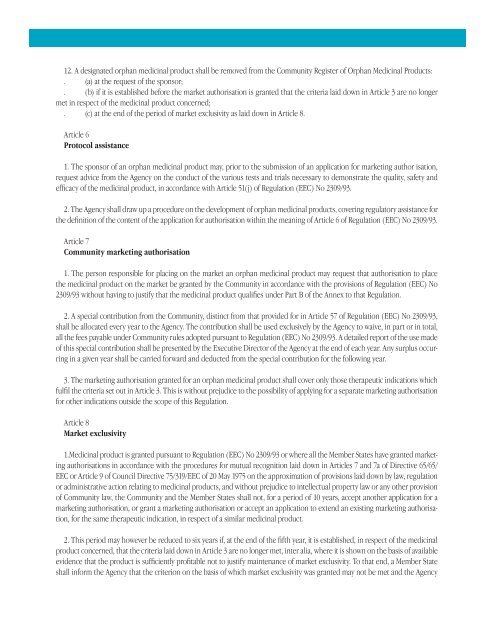Enfermedades raras, huérfanas y olvidadas - Afidro
Enfermedades raras, huérfanas y olvidadas - Afidro
Enfermedades raras, huérfanas y olvidadas - Afidro
You also want an ePaper? Increase the reach of your titles
YUMPU automatically turns print PDFs into web optimized ePapers that Google loves.
Rare, orphan and neglected diseases 34<br />
12. A designated orphan medicinal product shall be removed from the Community Register of Orphan Medicinal Products:<br />
. (a) at the request of the sponsor;<br />
. (b) if it is established before the market authorisation is granted that the criteria laid down in Article 3 are no longer<br />
met in respect of the medicinal product concerned;<br />
. (c) at the end of the period of market exclusivity as laid down in Article 8.<br />
Article 6<br />
Protocol assistance<br />
1. The sponsor of an orphan medicinal product may, prior to the submission of an application for marketing author isation,<br />
request advice from the Agency on the conduct of the various tests and trials necessary to demonstrate the quality, safety and<br />
efficacy of the medicinal product, in accordance with Article 51(j) of Regulation (EEC) No 2309/93.<br />
2. The Agency shall draw up a procedure on the development of orphan medicinal products, covering regulatory assistance for<br />
the definition of the content of the application for authorisation within the meaning of Article 6 of Regulation (EEC) No 2309/93.<br />
Article 7<br />
Community marketing authorisation<br />
1. The person responsible for placing on the market an orphan medicinal product may request that authorisation to place<br />
the medicinal product on the market be granted by the Community in accordance with the provisions of Regulation (EEC) No<br />
2309/93 without having to justify that the medicinal product qualifies under Part B of the Annex to that Regulation.<br />
2. A special contribution from the Community, distinct from that provided for in Article 57 of Regulation (EEC) No 2309/93,<br />
shall be allocated every year to the Agency. The contribution shall be used exclusively by the Agency to waive, in part or in total,<br />
all the fees payable under Community rules adopted pursuant to Regulation (EEC) No 2309/93. A detailed report of the use made<br />
of this special contribution shall be presented by the Executive Director of the Agency at the end of each year. Any surplus occurring<br />
in a given year shall be carried forward and deducted from the special contribution for the following year.<br />
3. The marketing authorisation granted for an orphan medicinal product shall cover only those therapeutic indications which<br />
fulfil the criteria set out in Article 3. This is without prejudice to the possibility of applying for a separate marketing authorisation<br />
for other indications outside the scope of this Regulation.<br />
Article 8<br />
Market exclusivity<br />
1.Medicinal product is granted pursuant to Regulation (EEC) No 2309/93 or where all the Member States have granted marketing<br />
authorisations in accordance with the procedures for mutual recognition laid down in Articles 7 and 7a of Directive 65/65/<br />
EEC or Article 9 of Council Directive 75/319/EEC of 20 May 1975 on the approximation of provisions laid down by law, regulation<br />
or administrative action relating to medicinal products, and without prejudice to intellectual property law or any other provision<br />
of Community law, the Community and the Member States shall not, for a period of 10 years, accept another application for a<br />
marketing authorisation, or grant a marketing authorisation or accept an application to extend an existing marketing authorisation,<br />
for the same therapeutic indication, in respect of a similar medicinal product.<br />
2. This period may however be reduced to six years if, at the end of the fifth year, it is established, in respect of the medicinal<br />
product concerned, that the criteria laid down in Article 3 are no longer met, inter alia, where it is shown on the basis of available<br />
evidence that the product is sufficiently profitable not to justify maintenance of market exclusivity. To that end, a Member State<br />
shall inform the Agency that the criterion on the basis of which market exclusivity was granted may not be met and the Agency


